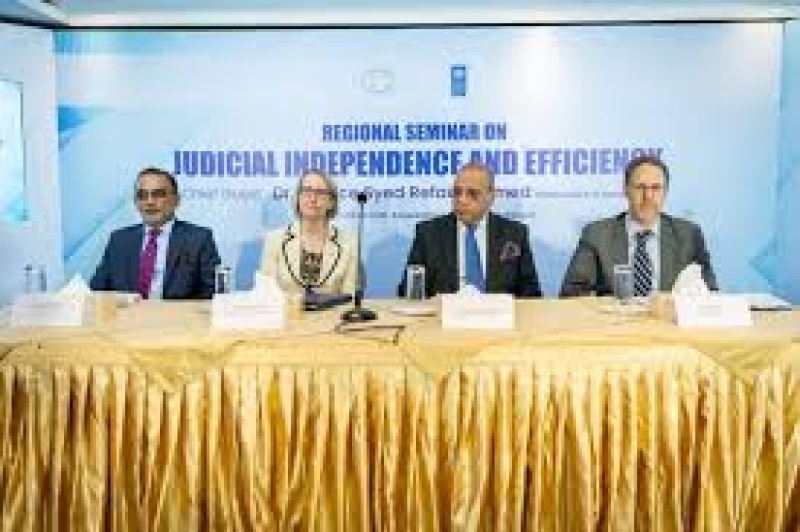- India Sees 9% Drop in Foreign Tourists as Bangladesh Visits Plunge |
- Dhaka Urges Restraint in Pakistan-Afghan War |
- Guterres Urges Action on Safe Migration Pact |
- OpenAI Raises $110B in Amazon-Led Funding |
- Puppet show enchants Children as Boi Mela comes alive on day 2 |
BD's Judiciary Must Lead Its Own Reform: Chief Justice

Chief Justice Dr. Syed Refaat Ahmed called on the judiciary to take the lead in its own reform, emphasizing the need for transparency, accountability, and independence from executive influence. Speaking at a regional seminar in Rangpur on Saturday, he stressed that judicial independence is foundational to upholding the rule of law.
“Judicial reform is no longer a distant goal; it is happening right now. Over the past eight months, we have implemented bold, transformative measures to ensure true judicial independence. These include establishing autonomous judicial bodies, embracing digital innovation, and offering people-centric services,” said the Chief Justice.
He also expressed deep appreciation for the support of the United Nations Development Programme (UNDP), which he credited with playing a key role in advancing judicial reforms across the country.
“The partnership with UNDP has been invaluable, and their continued support has been instrumental in driving this reform agenda,” Dr. Ahmed added.
British High Commissioner to Bangladesh, Sarah Cooke, underscored the importance of an independent and efficient judiciary in maintaining the rule of law and safeguarding individual rights and freedoms.
“It is more crucial than ever as Bangladesh forges a path toward a democratic, inclusive, and prosperous future,” she said during her address at the seminar. Cooke also reaffirmed the UK’s commitment to supporting justice sector reform and inclusive governance in Bangladesh.
She praised the Chief Justice’s roadmap for judicial reform, describing it as both timely and transformative. “The roadmap presents a strategic vision that responds directly to citizens’ aspirations for a fair, timely, and accessible justice system,” she noted.
The seminar, titled "Judicial Independence and Efficiency," was jointly organized by the Bangladesh Supreme Court and UNDP. It brought together senior members of the judiciary, legal experts, and development partners to discuss strategies for promoting transparency, efficiency, and accountability within the justice system.
In his welcome remarks, UNDP Bangladesh Resident Representative Stefan Liller highlighted the organization’s long-standing collaboration with the Supreme Court in supporting judicial reform.
“The divisional seminars are vital for ensuring an inclusive reform process by engaging judges from across Bangladesh. UNDP is proud to be part of this journey, which builds on over a decade of collaboration. Our support encompasses areas such as justice service delivery, digitalization, reducing case backlogs, improving court administration, and enhancing access to justice for vulnerable communities,” Liller said.
Justice Zafor Ahmed, a Judge of the High Court Division of the Supreme Court, delivered special remarks, emphasizing the critical importance of institutional autonomy for the long-term development of the judiciary.
Md Muajjem Hussain, Special Officer at the Bangladesh Supreme Court, presented the proposed framework for the "Independent Supreme Court Secretariat," highlighting its potential to strengthen the administrative and financial autonomy of the judiciary.
The regional seminar series continues to serve as a vital platform for dialogue and collaboration, contributing to the advancement of judicial excellence in Bangladesh.

